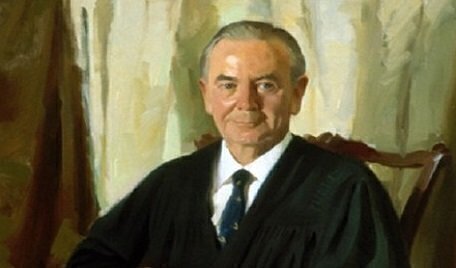On April 25, 1906, future Supreme Court Justice William J. Brennan was born in New Jersey. During his nearly 34 years at the Court, Brennan wrote the second-most opinions in the Court’s history, including several landmark majority decisions.
 A member of the Court’s liberal wing, Brennan served with three Chief Justices during his time in Washington. Brennan was the child of Irish immigrants; he grew up in Newark, New Jersey, attended the University of Pennsylvania and Harvard, and served in the United State Army before entering private law practice.
A member of the Court’s liberal wing, Brennan served with three Chief Justices during his time in Washington. Brennan was the child of Irish immigrants; he grew up in Newark, New Jersey, attended the University of Pennsylvania and Harvard, and served in the United State Army before entering private law practice.
Brennan later was serving on the New Jersey state Supreme Court when President Dwight Eisenhower nominated him to the United States Supreme Court as a recess appointment. The only Senator who later objected to the Brennan nomination was Joseph McCarthy.
Once on the Court, Brennan became known for his role in landmark opinions. In Baker v. Carr (1962), Brennan wrote the majority opinion that supported the concept of one person, one vote and the idea that the Supreme Court could decide “political questions” under the 14th Amendment if voting rights were violated.
Perhaps Brennan’s most-known opinion came in 1964, in New York Times v. Sullivan. Writing for a unanimous court, Brennan said public officials in defamation cases against the press needed to prove actual malice or "knowledge that [a statement made] was false or with reckless disregard for the truth."
Before the New York Times decision, the press had limited legal protections against libel and slander lawsuits, especially those launched by public officials who didn’t like negative press coverage.
Late in his career, Brennan wrote another landmark opinion in the flag-burning case, Texas v. Johnson. Again writing for the majority, Brennan recognized the burning of the American flag at a public protest as a protected form of symbolic free speech. ''If there is a bedrock principle underlying the First Amendment, it is that the Government may not prohibit the expression of an idea simply because society finds the idea itself offensive or disagreeable,” Brennan said, who was joined in his opinion by two new conservative Justices on the bench, Anthony Kennedy and Antonin Scalia.
Brennan retired in 1990 and passed away in July 1997. The official Supreme Court memorial resolution on Brennan’s passing noted the extraordinary scope of his career at the high court. “In the course of a remarkable tenure that fell short of Chief Justice John Marshall's by a matter of months, Justice Brennan authored 1,573 opinions: 533 opinions for the Court, 694 dissents, and 346 concurrences. Justice Brennan's opinions shaped our nation,” the resolution said.
The Court also noted Brennan’s role in crafting the unsigned, per-curium opinion in Brandenberg v. Ohio (1969), which held that public free speech could only be limited if it was “directed to inciting or producing imminent lawless action and is likely to incite or produce such action.” The resolution noted that “Justice Brennan's mastery of the interplay between First Amendment values and the institutional structures needed to protect them is at the core of Brandenburg v. Ohio. … [which] reflects a classic Brennan effort to develop legal doctrine strongly weighted in favor of individual freedom, but sufficiently flexible to permit regulation when absolutely necessary.”







